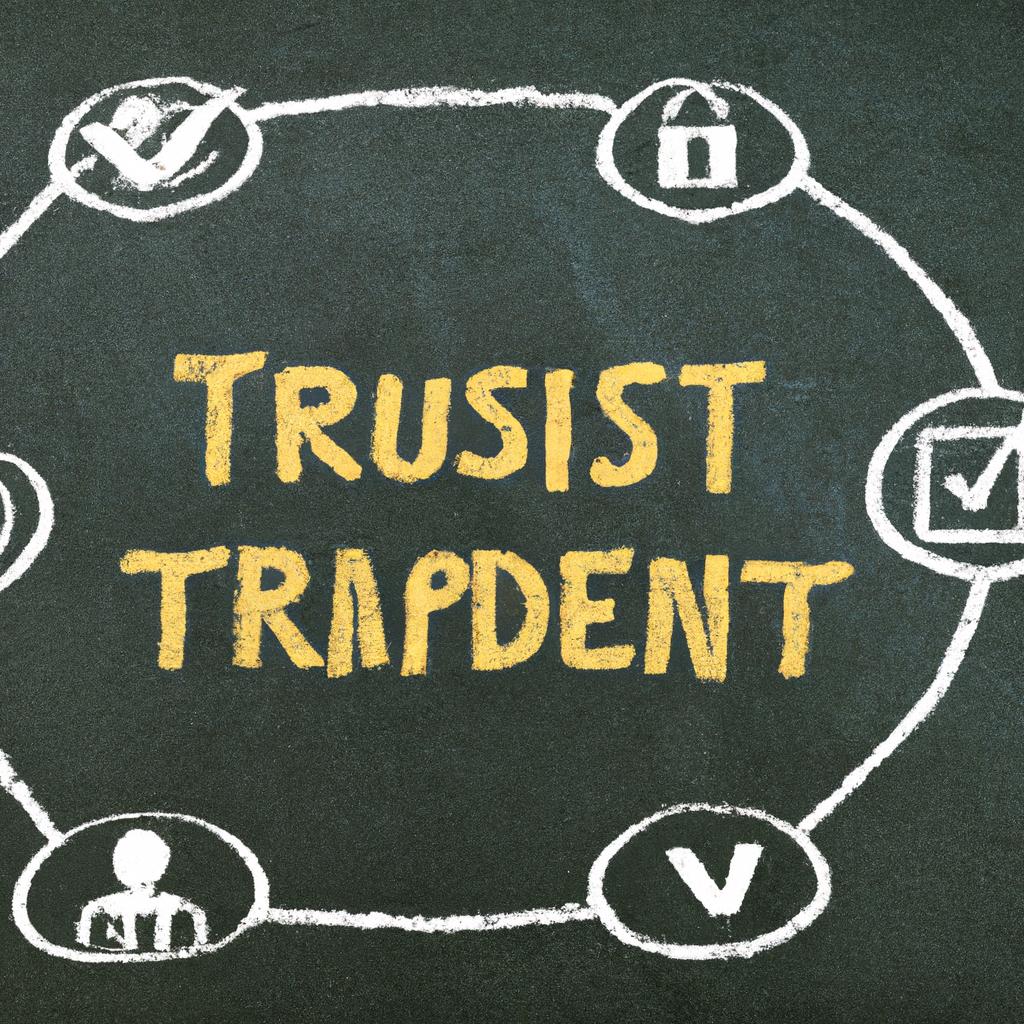In the ever-evolving landscape of digital commerce, the concept of trust certification has become an indispensable tool for businesses seeking to establish credibility and build consumer confidence. In today’s era of rampant cyber fraud and data breaches, individuals are increasingly wary of divulging sensitive information online. As experienced legal practitioners at Morgan Legal Group in New York City, we understand the importance of safeguarding personal and financial data. In this article, we will delve into the intricacies of trust certification and its significance in establishing trustworthiness in the digital realm.
Ensuring Trustworthiness: The Importance of Trust Certification in Business Transactions
Trust certification plays a crucial role in ensuring the trustworthiness of business transactions. In today’s fast-paced and digital world, customers are more cautious than ever when it comes to sharing their personal and financial information online. By obtaining trust certification, businesses can demonstrate that they take the security and privacy of their customers seriously.
Trust certification also helps businesses build credibility and differentiate themselves from competitors. When customers see that a business has been certified by a trusted third-party organization, they are more likely to feel confident in making a purchase or entering into a transaction. In an era where data breaches and online scams are prevalent, trust certification is not just a nice-to-have but a must-have for businesses looking to thrive in the digital marketplace.

Navigating Trust Certification Standards: Understanding Key Criteria and Guidelines
When it comes to trust certification, there are crucial criteria and guidelines to consider. Trust certification standards ensure that trust providers meet certain requirements to safeguard the interests of clients. One key criterion is transparency, where trust providers must disclose all relevant information to clients to establish trust and accountability. Transparency includes sharing details about fees, investment strategies, and potential risks associated with the trust.
Another essential aspect of trust certification is expertise. Trust providers must demonstrate a high level of knowledge and experience in managing trusts. This expertise ensures that clients receive sound advice and guidance when creating and managing their trusts. Additionally, trust certification standards often require trust providers to adhere to ethical guidelines and best practices to protect the interests of trust beneficiaries.

Trust Certification Best Practices: Strategies for Building Credibility and Consumer Confidence
Building trust with consumers is essential for any business looking to establish credibility in the market. Trust certification best practices play a crucial role in reassuring customers about the reliability and authenticity of your products or services. By implementing strategic trust-building tactics, businesses can instill confidence in their target audience and differentiate themselves from competitors.
One effective way to build credibility and consumer confidence is by obtaining recognized trust certifications. These certifications serve as a signal to customers that a business has met certain standards and is committed to upholding a high level of trustworthiness. Additionally, displaying trust badges prominently on your website can further reinforce your commitment to transparency and integrity. Investing in trust certification not only enhances your company’s reputation but also creates a sense of security for potential customers, ultimately leading to increased sales and customer loyalty.
Securing Trust Certification: Steps for Obtaining and Maintaining Trustworthy Credentials
In order to obtain and maintain trustworthy credentials, there are several steps that must be carefully followed. The first step is to thoroughly research reputable certification programs that are recognized within your industry. Look for programs that have a strong reputation for upholding high standards of trust and integrity.
Once you have identified a certification program that aligns with your values and goals, it is important to thoroughly review the eligibility requirements and application process. Be sure to gather all necessary documentation and information to support your application, such as references, testimonials, and relevant experience. Additionally, be prepared to undergo a rigorous evaluation process to demonstrate your commitment to upholding the principles of trust certification.
Q&A
Q: What is trust certification?
A: Trust certification is a verification process that businesses undergo to assure customers that they are trustworthy and secure.
Q: Why is trust certification important?
A: Trust certification is important because it helps build credibility and trust with customers, leading to increased sales and customer loyalty.
Q: How does trust certification benefit businesses?
A: Trust certification benefits businesses by providing a competitive advantage, improving customer satisfaction, and increasing conversion rates.
Q: How can businesses obtain trust certification?
A: Businesses can obtain trust certification by meeting certain criteria set by certification bodies, such as implementing security measures, protecting customer data, and offering transparent policies.
Q: What are some well-known trust certification programs?
A: Some well-known trust certification programs include TRUSTe, BBB Accreditation, and Norton Secured.
Q: Can trust certification be revoked?
A: Yes, trust certification can be revoked if a business fails to maintain the standards required for certification or if they engage in unethical or fraudulent practices.
Q: How can customers verify trust certification?
A: Customers can verify trust certification by looking for trust seals or badges displayed on the business website, as well as checking the certification status on the certification body’s website.
To Wrap It Up
In a world filled with endless options and constant uncertainty, trust certification provides consumers with the reassurance they need to make informed decisions. By choosing products or services that are backed by a reputable trust certification, individuals can feel confident in their choices and build trust with the brands they support. So next time you’re faced with a decision, look for that trust certification logo and rest easy knowing that you’re choosing a reliable and trustworthy option. Trust certification - because trust is the foundation of every relationship, including the one you have with the products you use.
 Trust Certification: A Key Factor for Building Trust with Consumers
Trust Certification: A Key Factor for Building Trust with Consumers
Trust is one of the most crucial factors in the success of any business. It is the foundation of any healthy relationship, including the one between a business and its customers. In today’s competitive market, where consumers have endless options, trust has become even more critical. Consumers are more cautious about who they do business with and are more likely to choose companies they trust.
In the digital age, where online shopping has become the norm, it can be challenging for businesses to establish trust with their customers. This is where trust certification comes in – a vital tool that helps businesses build and maintain trust with their customers. In this article, we will delve into the concept of trust certification, its benefits, and how businesses can obtain it to gain a competitive edge in the market.
What is Trust Certification?
Trust certification, also known as trust seals or trust badges, are visual symbols displayed on a website to show that the website is legitimate and trustworthy. They act as proof that the company has taken necessary security measures to protect its customers’ sensitive information, such as credit card details, personal data, etc. These seals are typically displayed on a website’s homepage, product pages, or checkout pages to provide assurance to consumers that the business is genuine, and their information is safe.
Different Types of Trust Certification
There are various types of trust certification, and each comes with its own set of requirements and qualifications. Some of the most popular trust certification programs include:
1. SSL Certificates – Secure Socket Layer (SSL) certificates are a combination of digital encryption and authentication technologies that establish a secure, encrypted connection between a web server and a browser. SSL certification is essential for businesses that process sensitive information, such as credit card details or personal data.
2. Privacy Seals – In today’s digital world, where data breaches and privacy scandals are becoming increasingly common, consumers are more concerned about their privacy. A privacy seal certifies that a company has a privacy policy in place that protects consumers’ data and that the business complies with relevant privacy laws and regulations.
3. Business Certifications – These are certifications that verify a business’s identity and legitimacy, such as a business license, permits, or accreditations from recognized organizations. These certifications assure consumers that the company is operating legally and that they can trust them to deliver quality products or services.
4. Payment System Seals – Payment system seals are displayed by businesses that accept online payments. These seals ensure that the website is secure and encrypted, making it safe for consumers to make online purchases without the risk of their credit card information being compromised.
Benefits of Trust Certification
1. Builds Consumer Confidence – One of the most significant benefits of trust certification is that it instills confidence in consumers. When a website displays trust seals, it reassures consumers that the business has taken necessary measures to secure their information, making them more likely to do business with them.
2. Improves Conversion Rates – According to a study by the Baymard Institute, trust seals help improve conversion rates by an average of 9%. This is because trust certification reassures consumers that the website is legitimate, and their transaction will be secure, thereby increasing their trust in the business and encouraging them to make a purchase.
3. Differentiates from Competitors – In today’s crowded marketplace, trust certification can help businesses stand out from their competitors. Displaying trust seals on a website shows that the company takes its customers’ security and privacy seriously, making them a more attractive choice for consumers.
4. Increases Customer Loyalty – Trust certification is not just about winning new customers; it also helps in retaining existing ones. When consumers see trust seals on a website, it gives them a sense of security and reassurance, making them more likely to return to the same business for future purchases.
How to Obtain Trust Certification?
Obtaining trust certification is an essential step for businesses that want to succeed in today’s competitive market. Here are some practical tips for businesses to get trust certification:
1. Identify the Most Relevant Certification for Your Business – The first step in obtaining trust certification is to determine which certification best suits your business. If your company processes online payments, payment system seals would be most relevant, while a business certification would be ideal for a company that operates in a regulated industry.
2. Fulfill the Requirements – Once you have identified the relevant certification, the next step is to fulfill the requirements. For example, to obtain an SSL certificate, you need to purchase and install it on your website. To obtain a business certification, you may need to provide necessary documents and permits.
3. Partner With Trustworthy Providers – It is essential to partner with reputable providers when obtaining trust certification. Working with trusted providers ensures that the certification is legitimate and recognized by consumers.
4. Display Trust Seals Prominently on Your Website – Finally, it is crucial to display trust seals prominently on your website to gain their full benefit. Place them on visible areas of your site, such as the homepage, checkout page, or product pages.
Conclusion
In a world where consumers are more cautious than ever before, trust certification is an indispensable tool for businesses to build and maintain trust with their customers. It is a seal of approval that lets consumers know they can trust a business to keep their information safe and secure. Obtaining trust certification not only helps businesses gain customer trust but also improves conversion rates, differentiates them from competitors, and increases customer loyalty. By following the tips mentioned above, businesses can obtain trust certification and use it to their advantage.

